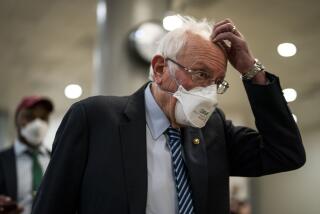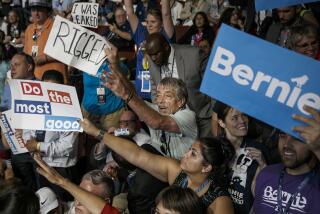Edwards ends presidential bid
WASHINGTON â He launched his campaign in the hurricane-ravaged quarters of New Orleans and traveled through Appalachia, talking about poverty and railing against corporate greed and financial disparities. But something strange happened as John Edwards built his campaign for president: He drew votes from an economically diverse bloc, mostly white men, who were just as likely to be rich as they were to be poor.
Now that Edwardsâ departure has left a two-person race for the Democratic nomination, Hillary Rodham Clinton and Barack Obama are trying to figure out how to attract those voters. And because Edwardsâ support was hard to characterize -- the one thing it was not was disproportionately poor -- his political base is the subject of a scramble.
The latest surveys show Edwards supported by as much as 15% of the Democratic electorate, enough to make a difference Tuesday when voting takes place in California and more than 20 other states as part of a crucial nationwide primary day. But where these votersâ sympathies will lie is a mystery.
âIt looks pretty close,â said Andrew Kohut, director of the Pew Research Center for the People & the Press. The Edwards base will feel âcross-pressured,â Kohut said, with men more likely to support Obama and other lower-income voters probably moving to Clinton.
The two senators moved quickly Wednesday to attract that base, adopting pieces of Edwardsâ populist message.
Clinton, of New York, lauded Edwards for making poverty âa centerpiece of his candidacyâ and said the issue should be âon the top of the list of American priorities.â Obama, of Illinois, called Edwardsâ return to New Orleans a âgracious way to endâ his campaign.
But the decision by the former North Carolina senator to leave the race, along with the makeup of his base, suggests that the fiery populism he brought to the campaign was a doomed strategy from the beginning.
Over time, his initial focus on the poor evolved to issues important to working people and the middle class -- a recognition of where the votes would come from.
âWhen it gets closer to election day, itâs just pretty hard to stay focused on that [anti-poverty] message when thereâs another group thatâs going to be more influential,â said Jason Furman, who was policy director for the 2004 Democratic presidential nominee, Sen. John F. Kerry.
Aides to Edwards said Wednesday that his message had simply been overshadowed by the history-making potential of his two rivals. But several analysts who track public opinion on the economy said they doubted that a focus on poverty, complaints about rising income inequality and a call to dislodge corporate power from Washington could have drawn substantial numbers of voters.
Poverty and income inequality âmay not be the primary thing you want to hang your campaign on,â said Harry Holzer, an economist in Washington with Georgetown University and the Urban Institute, a nonpartisan policy organization. âEspecially poverty -- since it doesnât directly affect most voters, you probably donât want to make that your primary reason for running.â
Edwards made poverty a central, animating mission for his candidacy. He also talked often of the problems of working-class Americans, repeatedly reminding voters that his father had been a millworker.
Over time, his campaign took on a more emphatic and even angry tone as he drew pictures of health insurance companies denying coverage that could save patientsâ lives. He promised to kick corporate interests out of the room when negotiating public policy, saying his hardball tactics would work where his opponents would fail. âYou canât âniceâ these people to death,â he said.
But Edwardsâ tone may have run too hot for the taste of some voters, even those feeling anxious about the economy.
Though a forceful populist message has worked at times -- as in Democrat Sherrod Brownâs successful 2006 Senate race in Ohio against incumbent Republican Mike DeWine -- Americans are generally reluctant to embrace anti-corporate messages, Holzer said.
Clinton, by contrast, has portrayed herself as empathizing with peopleâs economic fear, rather than angry over their situation. She talks of a âtrap-door economyâ in which families are one layoff away from falling through the floor, but she has generally avoided the broad anti-corporate language that Edwards adopted.
Surveys of voters in early primary and caucus states showed that Edwards, despite his specific message, never found a niche.
In New Hampshire, he finished third among lower-income voters, taking 16% of those earning less than $50,000 a year, according to media exit polls. He won 17% of those voters making more than $50,000. He won 11% of voters without high school diplomas and 18% of college graduates.
In the Iowa caucuses, he lost handily to both Obama and Clinton among voters with annual household incomes of less than $50,000 but took a quarter of those in households earning more than $50,000, beating Clinton in that category (and placing second in the state overall, his best showing in the campaign).
And a new Los Angeles Times/CNN survey of California Democrats, taken before Edwards dropped out, showed him performing far better among upper-income voters than lower-income voters.
Still, campaign strategists believe Edwards retains power should he choose to make an endorsement. Also, he controls 26 delegates to the partyâs national convention, and he has not said whether he plans to release them.
He said Wednesday in New Orleans that he dropped out only after receiving assurances from both Clinton and Obama that they would make poverty a central theme of their campaigns and, if elected, their presidency.
Alluding to the fact that his departure assures a nominee who is not a white man, Edwards said he was stepping aside âso that history can blaze its path.â
He also offered a critique of his own party for what he said was a lack of focus on the poor.
âI donât know how it started,â he said. âI donât know when our party began to turn away from the cause of working people, from the fathers who were working three jobs, literally, just to pay the rent, mothers sending their kids to bed wrapped up in their clothes and in coats because they couldnât afford to pay for heat.â
--
Times staff writers Aaron Zitner in Washington, Peter Nicholas in Little Rock, Ark., and Maria L. LaGanga in Denver contributed to this report.
More to Read
Get the L.A. Times Politics newsletter
Deeply reported insights into legislation, politics and policy from Sacramento, Washington and beyond. In your inbox three times per week.
You may occasionally receive promotional content from the Los Angeles Times.










